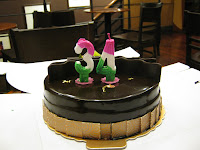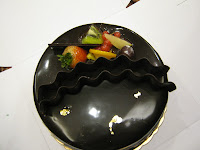 From the Lonely Planet guide to Taiwan: It is quite difficult to get to Shitoushan. No kidding!
From the Lonely Planet guide to Taiwan: It is quite difficult to get to Shitoushan. No kidding!I wanted to try anyway because the description of temples built into the sides of the mountains was very appealing. Living in Taipei is great, but it certainly makes me yearn for some peace and quiet.
Relatively early on Saturday, Jesse and I made our way to Taipei Main Station to get on a train headed for Hsinchu, the largest town near our destination. From there, our plan was to go to the Hsinchu Bus Station, tell them where we wanted to go and see what our options were. We considered the possibility that we would need to sleep overnight, but we were trying to avoid it.
There are two different rail systems now in Taiwan - the High Speed Rail and the regular train system. The HSR is brand new, very fast, more expensive, etc. If you are going to a major city it is definitely the best option. More expensive - but comfortable and fast! The regular train system has both express and local trains. It is clean and airconditioned and everything. Its not a bad option at all. The local can take a long time, but if you are prepared for it, it isn't so bad. The tricky thing about the regular train is that this time of year it is pretty crowded as kids are out of school and visiting their grandparents and what not. In Taiwan, they issue tickets on the train even if there are no seats. People simply stand in the aisle, sit on the floor, sit in the gangway or the bathroom or whatever the entire trip. If the trip is only one hour, that isn't so bad, but if its the entire length of the island, that could be tough. So the disadvantage of the regular train is 1. it may be hard to get a seat this time of year and 2. even if you have a seat, there will be people crammed up in the aisle next to you. Jesse says this does not bother him, but I find it uncomfortable.
So we have seats about half of the one hour long trip to Hsinchu. In Hsinchu we ate lunch at the department store food court and walked to the bus station. There, our timing was great because we immediately got on a bus headed in the direction of our destination. I spoke with the driver and told

him where we wanted to go. When we arrived at the appropriate stop about 45 minutes later, I heard a loud, "Hallo!" and I knew that was where the foreigners were supposed to get off the bus! :) If you tell the bus driver where you want to go, I find they almost always tell you when it is the correct stop.
Now we were in Jhudong, which was still not our final stop. This is a small town, and there wasn't an attendant at the bus station office. So Jesse and I hung around for a few minutes. When I saw a driver get on his bus I got on and told him where we wanted to go, and he just told me to wait for the office attendant. Jesse in the meantime tried to figure out the timetable on the wall, but it was all in Chinese so it is pretty tough. I asked another driver who went to find out for me. Yet a third driver emerged from the office and informed us the correct bus would leave in about 45 minutes. Great! He was even prescient enough to ask me if I planned to return today. I said I would if possible. He reminded me the last bus left at 5:35pm - pretty crucial information I should have asked.
So we wandered around town for a half hour. We checked out

their local temple / opera stage set up and I bought an iced sour lemonade.
Sidenote: I can never get enough ice or cold drinks here. When I purchased the lemonade, I asked if I could please also have one cup of just ice. No. I said, I will buy 2 drinks. One lemonade and one 'just ice' drink please. Much discussion. I mentioned I understood this was strange, but all I really wanted was some ice. The shopgirl said she could give me a little ice in my bag (they give you your drink in a cup, in a bag here). I said again, I will pay you whatever you want for a cup of ice. No. I finally gave up and said, ok, please can I have a large lemonade. This kind of situation makes my inner American crazy! I do not think there is a problem I do not know about with giving me ice, it is simply not one of the options on the menu list. I have asked for something that is not part of the set options. Even though I think I expressed clearly that I would pay for this, to make such a transaction that is not from the menu is impossible. I have encountered this type of refusal several times. My American thinking is, "I am giving you more than the asking price for this product - you are getting a good trade from this request, so why can you not do this for me?" I suppose another way of thinking about it is, "These are the options we are offering you. Choose from this list only. Other choices are not within the realm of possibility."
At 2pm, we boarded the bus to Shitoushan. I asked the driver to drop us off at a specific trail head listed in the guidebook. He informed me the bus did not go that far, but he would take us to the visito

r center. Ok, good enough.
Up the mountain we went, of course, in the rain. When we reached the appropriate stop, we were the only people left on the bus and the driver worried we did not have umbrellas. I actually did, it was just in my backpack. There were some signs in English there, indicating the trail and the direction of the visitor center. Jesse was eager to get up the mountain, but I was worried about the time, so I suggested we stop at the visitor center to inquire about lodging.
So we found the visitor information desk, and I tried to ask about the trails, their length, and if there was lodging at the monastery. About 6 people were trying to help me. I was feeling really good about my Chinese because I thought the attendant understood me and was calling the monastery to see if they had a room for the night. Instead, she was calling a park ranger who spoke English!
A young man dressed in a park ranger uniform, in his twenties shows up and asks in perfectly American accented English, "Can I help you?" Now, really, this was a very good thing, but I was feeling a little disappointed about my Chinese when this happened. After quite a lengthy discussion about what trails and roads were washed out, how long the various hikes were, and where buses ran, he suggested he could just drive us to the location we were interested in and from there, we could catch a bus to a different town, where we could catch the train back to Hsinchu and ultimately Taipei. Wow! In the van a few minutes later, I pointed out he must have studied in the States because his American accented English was so great. He went to UC Irvine! Amazing. Turns out he is completing his mandatory Taiwanese military service by working as a ranger at this remote area. He speaks 4 languages - Taiwanese, Chinese, English and Japanese, so his unique skills qualify him to do 'alternative service.'
Twenty minutes of a curving mountain pass later, we arrived at our destination - the Temple Trail at Lions Head Mountain. It was 3:30pm. We ascertained the last bus to Nanjhuang - our alternative route home - left at 6pm, said goodbye to the park ranger who lives in the same town as my own parents, and began exploring.
There is much more to say about our trip, but this will have to be it for now. More details later!
 1. The trippy, glow in the dark, black-lighted temple decoration.
1. The trippy, glow in the dark, black-lighted temple decoration. 2. Wheelchair accessible motor scooter!
2. Wheelchair accessible motor scooter! 3. I don't know what to call this, but I feel sorry for this dog. The dog is inside the shopping mall, in a stroller, on a blanket, wearing doggie-clothes, wearing a doggie-visor, has a neck support pillow, and is being forced to listen to monks chanting sutras playing on the cassette recorder attached to the stroller by a bungee cord. Um, yeah.
3. I don't know what to call this, but I feel sorry for this dog. The dog is inside the shopping mall, in a stroller, on a blanket, wearing doggie-clothes, wearing a doggie-visor, has a neck support pillow, and is being forced to listen to monks chanting sutras playing on the cassette recorder attached to the stroller by a bungee cord. Um, yeah.









































